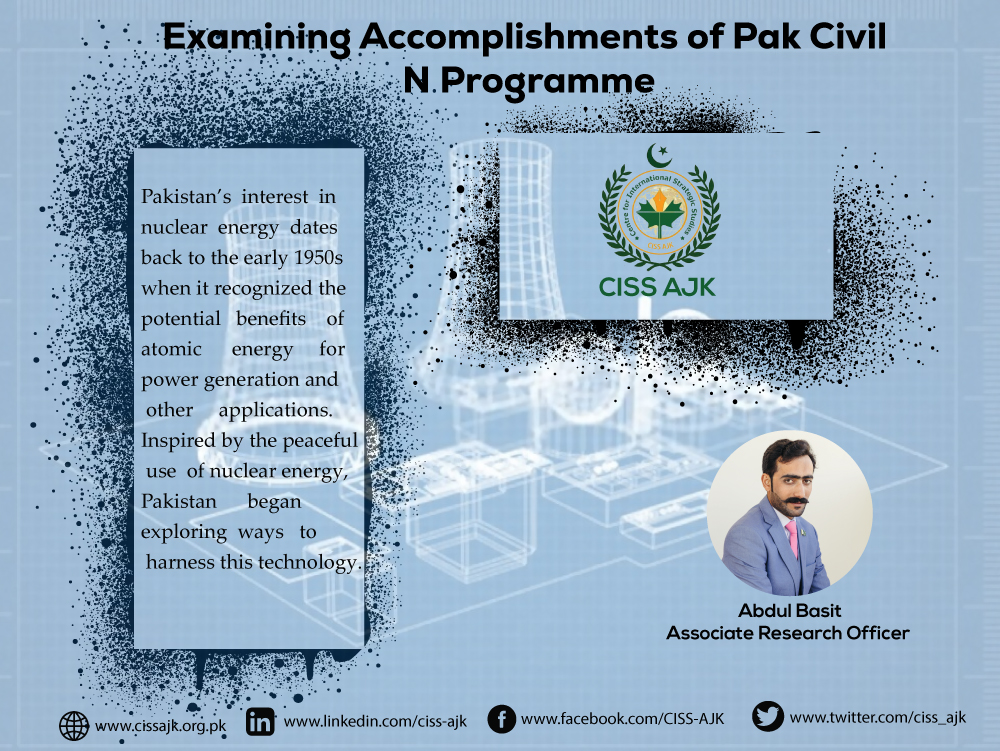549
PAKISTAN’S interest in nuclear energy dates back to the early 1950s when it recognized the potential benefits of atomic energy for power generation and other applications. Inspired by the peaceful use of nuclear energy, Pakistan began exploring ways to harness this technology. To spearhead its nuclear ambitions, Pakistan established the Atomic Energy Commission (PAEC) in 1956. Pakistan has invested in nuclear research facilities and laboratories to enhance its knowledge base and explore new applications of nuclear technology. PINSTECH is a prominent research institution.
Energy Generation: Nuclear power is 9.8% of the global energy mix and Pakistan is working to increase its share. One of the primary objectives of Pakistan’s civil nuclear program was to address the country’s growing energy demands. Other power generation sources include hydro, thermal, natural gas, coal, wind and solar. Nuclear power has the potential to contribute more to the national grid if invested. It is important to assess how many nuclear power plants Pakistan operates and has under construction and its nuclear energy outlook in the coming decades. Pakistan recognizes the importance of nuclear energy as a viable source of electricity.
The Pakistan Atomic Energy Commission has been actively involved in the development of nuclear power plants. At the national level, Pakistan’s economy has been severely impacted by energy shortage, prompting the search for long-term alternative energy solutions. Nuclear energy emerges as a viable option due to its cleanliness and sustainability. As of 2015, Pakistan’s installed nuclear capacity, comprising CHASNUP I & II and KANUPP, amounted to 787 MWe, representing 3.17% of the country’s total installed generation capacity. Pakistan has six nuclear power plants, including the K-3 Unit of the Karachi Nuclear Power Plant, which was connected to the national grid in March 2022 and was the second overseas unit to use China’s third-generation nuclear reactor technology.
Research Reactors and Isotope Production: Pakistan has developed research reactors for various applications, including the production of medical isotopes for cancer treatment, research and industrial applications. Two research reactors at PINSTECH, Islamabad, are utilized for radioisotope production. There is one operational cyclotron facility at Shaukat Khanum Memorial Hospital in Lahore, with another facility at INMOL, Lahore, currently being installed. Tandem accelerators in Islamabad and Lahore are employed for research purposes, with no focus on isotope production. Radioisotope production began with the criticality of Pakistan Research Reactor-1 (PARR-1) in December 1965.
PINSTECH operates both PARR-1 and PARR-2, providing radioisotope production and neutron irradiation services. PARR-1 was converted to operate with low-enriched uranium (LEU) fuel to address proliferation concerns. PARR-2 is a tank-in-pool type research facility using highly enriched uranium (HEU) as fuel. It has ten irradiation sites for R&D work. PARR-1 has been instrumental in training manpower and serving as a neutron source for research. The Pakistan Institute of Engineering and Applied Sciences (PIEAS) plays a vital role in nuclear research and education.
Nuclear Safety and Security: Ensuring the safety and security of Pakistan’s nuclear facilities is of utmost importance. The PAEC has implemented measures to maintain the security of its nuclear material and infrastructure. Pakistan has also established an independent regulatory body, the Pakistan Nuclear Regulatory Authority (PNRA), to oversee nuclear safety and security matters. The nuclear safety and security mechanism in Pakistan is in accordance with the standards set by the International Atomic Energy Agency (IAEA).
Pakistan’s peaceful nuclear program is world-class, supported by the Nuclear Security Index Report. It has a 7-point increase in its score, making it the most improved country in terms of securing weapons-usable nuclear material. Pakistan’s long-standing support for peaceful use of nuclear technology, strategic restraint efforts, nuclear safety and security measures and stringent export control regime place it among the best nuclear programs in the world. The international community, including the US and the International Atomic Energy Agency, has repeatedly appreciated Pakistan’s growing nuclear credentials.
International Collaboration: Pakistan has engaged in international collaboration on nuclear research and development. It has participated in forums like the International Atomic Energy Agency and has sought assistance and support from other countries in developing its nuclear energy sector. On the regional level, Pakistan perceives the Indo-US nuclear deal as challenge to the strategic balance in South Asia and the comes despite India being a non-signatory of NPT. This has led to India entering into nuclear agreements with various countries, potentially undermining regional stability and the equilibrium of nuclear capabilities.
In the international arena, Pakistan’s foreign policy objectives are rooted in non-discrimination and an equal-security-for-all approach. Pakistan seeks to protect its national security interests while actively fostering friendly relations with countries worldwide, particularly major powers. This approach reflects Pakistan’s commitment to pursuing mutually beneficial partnerships and maintaining peace and stability on a global scale. Pakistan has taken measures to strengthen protections against theft or accident and has placed all its research and power reactors under IAEA safeguards. Pakistan’s civil nuclear program has contributed to energy security, nuclear research and applications, and is committed to the peaceful use of nuclear energy.
The writer is Assistant Research Officer at Centre for International Strategic Studies AJK.
Email: abdulbasit37748@gmail.com

